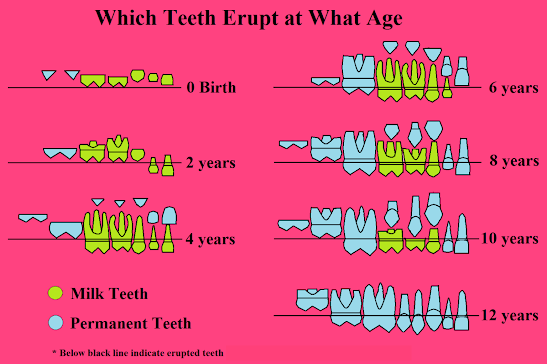How Many Teeth Does a Human Have?
Humans get two full sets of teeth over the lifetime: 1. As a baby, you should have 20 primary teeth, and 2. As an adult, you have 32 permanent teeth. However, the number of teeth a human being should have depends on their age and overall health.
How many teeth should a child have?
By the age of 3 years, the average child should have 20 baby teeth. 10 teeth in upper jaw and 10 teeth in lower jaw. Baby teeth are also known as milk teeth, primary teeth, or deciduous teeth. Primary teeth are the first set of teeth develop in a child’s mouth. The first primary teeth, start to erupt (come-in) when child is between 6 and 9 months old. For most children, all 20 primary teeth erupt by the age of 3 years. Primary teeth are temporary teeth, eventually fall out (exfoliate) and replaced by permanent teeth as the child grows. Between the ages of about 6 and 7 years, the primary teeth start to shed and the permanent teeth begin to erupt. The last baby teeth usually lost around the age of 12 years. By the age of 12 to 13 years, most children have lost all of their primary teeth and have 28 of their permanent teeth. The remaining 4 permanent teeth, the wisdom teeth, usually erupt between the ages of 17 and 21 years.
Why do we need Baby Teeth?
Primary teeth help child to chew and speak, that make the jaws grow to accommodate larger and stronger permanent teeth. They hold space (space-keepers) for permanent teeth growing in the jaws. Even though baby teeth are temporary, it’s very important to keep them clean to maintain lifelong oral health, because tooth decay
in childhood can adversely affect adult teeth. Furthermore, primary teeth play an important role in the overall growth and development of child.
Types of Primary teeth and their numbers:
- Incisors: Total 8 incisors located in the front of the mouth, 4 in upper jaw and 4 in lower jaw.
- Canines: Total 4 canines located at corner of the mouth next to incisors, 2 in upper jaw and 2 in lower jaw.
- Molars: Total 8 molars located in the back of the mouth, 4 in upper jaw and 4 in lower jaw.
How many teeth should an adult have?
By the age of 21 years, the average person has 32 permanent teeth, including 4 wisdom teeth. Wisdom teeth also known as third or last molars, typically erupt (comes-in) between the ages of 17 and 21 years. In some cases, wisdom teeth may not erupt at all or may become blocked and require removal. However, studies showed that the human jaws began shrinking around the time humans transitioned from hunter-gatherers to farmers. This is because of cooked softer and easier to chew food. In modern times, we are eating more soft and refined food, which didn’t require a big jaw. That’s why, not everyone can fit all 32 adult teeth in their jaws. The average mouth of present generation is made to hold only 28 permanent teeth and missing or blocked all 4 wisdom teeth.
A little variation in the eruption of either primary or permanent teeth is considered normal, and that can be due to variety of factors such as genetics, nutrition, health status and environmental factors.
Types of Permanent teeth and their numbers:
Out of total 32 permanent teeth, 16 teeth are present in the upper jaw and 16 in the lower jaw. Among these teeth are 8 incisors, 4 canines, 8 premolars and 12 molars (including 4 wisdom teeth).
- Incisors: Total 8 incisors located in the front of the mouth, 4 in upper jaw and 4 in lower jaw.
- Canines: Total 4 canines located at corner of the mouth next to incisors, 2 in upper and 2 in lower jaw.
- Premolars: Total 8 pre-molars, 4 in upper and 4 in lower jaw, located between the molars and the front teeth (incisors and canines).
- Molars: Total 12 molars, including 4 wisdom teeth or last molars. Molars are located in the back of the mouth, 6 in the upper and 6 in the lower jaw.
Conclusion
Humans get two full sets of teeth over the lifetime, 20 primary teeth in childhood and 28 to 32 permanent teeth in adulthood. However, some people have fewer or more teeth due to various reasons, such as genetics, dental problems, or injury. Proper oral hygiene and regular dental check-ups can help maintain healthy teeth and ensure they last a lifetime.
References
- Human jaw shrinkage, https://en.wikipedia.org/wiki/Human_jaw_shrinkage.


